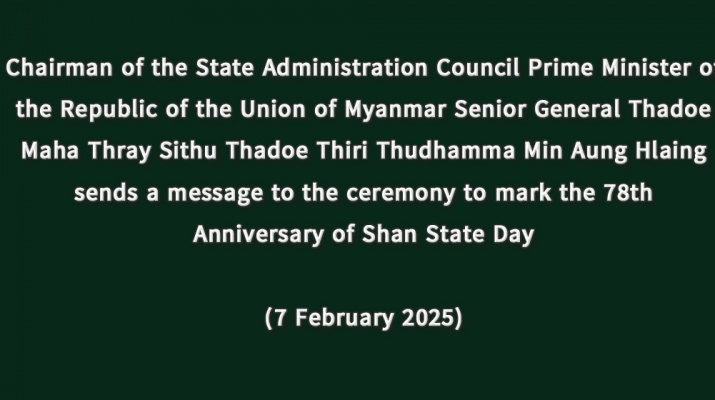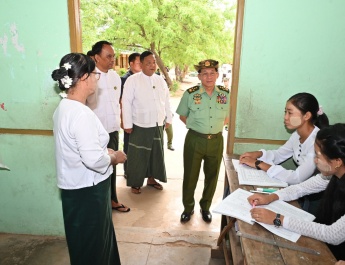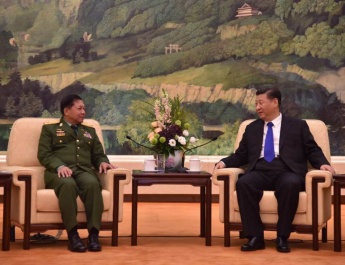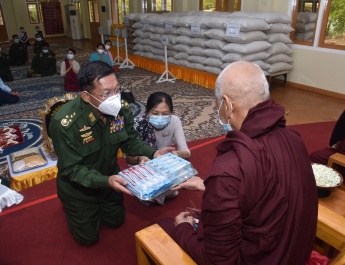(7 February 2025)
Esteemed ethnic national brethren in Shan State,
On this auspicious occasion of the 78th Anniversary of Shan State Day, which falls on 7 February 2025, I extend my heartfelt greetings and best wishes to all ethnic national brethren across Shan State and the entire nation. May you all be blessed with good health and happiness.
Shan State is the largest state in terms of area among all regions and states in Myanmar and is also home to the highest number of ethnic groups.
Within Shan State, various Shan ethnic tribes, including Shan, Pa-O, Palaung, Danu,Intha, Taungyo, Wa, Htanot, Kokang, Lahu, Yinnet, Yinkya, Myaungzee, and Arkha, coexist alongside other ethnic groups such as Kachin, Kayah, and Lisu.
These diverse ethnic communities have lived together for a long time, demonstrating a strong tradition of unity and harmony in the spirit of the Union.
Looking back the historical evidence, artifacts from Myanmar’s Late Stone Age and the period of urban cultural development can be found in Shan State.
The linguistic heritage, cultural traditions, and artistic legacy of the ethnic groups within Shan State are closely intertwined with the overall cultural and artistic landscape of the Union. This serves as a testament to the long-standing history of peaceful coexistence and mutual harmony among the people of the Union for many centuries.
During the three aggressive invasions by the British colonialists, the Shan Saophas and the Shan ethnic people, along with other ethnic groups, united and fiercely resisted.
Their tradition of standing together with unwavering patriotism and dedication to national sovereignty remains a source of pride and honour for the Shan State and the Shan people.
From the time the British colonized Myanmar, they ruled the mountainous regions and the lowlands—once united and undivided—through various divideand-rule tactics.
Even when they were eventually compelled to grant Myanmar its independence, they attempted to continue their divisive governance over the mountainous regions. To counter this effort, Shan Saophas who were members of the Shan State Saophas’ Council, along with representatives of the Shan State People’s Freedom Organization, held discussions in Panglong,
Shan State, from 3 to 6 February 1947. As a result, on 7 February 1947, they successfully formed the Shan State Council Executive Committee, comprising a total of 14 members—seven public representatives and seven Saophas representatives. Additionally, they petitioned the British government to abolish the Shan State Saophas’ Council, which had previously functioned under colonial rule.
The Shan State Council Executive Committee ultimately signed an agreement to achieve independence together with the mainland of Myanmar.
On 11 February 1947, during the Panglong Conference, 7 February was designated as Shan State Day to commemorate the unity and agreement reached for the future of the state and the nation. The decision, based on the solidarity of Shan princely rulers and local leaders, became a strong foundation for the historic Panglong Agreement and the emergence of Union Day.
This year marks the 78th anniversary of the designation of 7 February as Shan State Day.
As it played a crucial role in supporting Myanmar’s journey to independence, it is also a significant and revered day for ethnic nationalities.
The emergence of Shan State Day is closely linked to a significant historical event in which colonial rulers’ divide-and-rule policies were successfully resisted. It also stands as a firm testament to the historic event of “Union Day,” which symbolized the crucial effort of ethnic unity and solidarity in the struggle for national independence.
Ethnic unity is of utmost importance for the peace, stability, and sovereignty of a nation.
Moreover, as it serves as a driving force for national development, it is essential to remove doubts among ethnic national brethren and engage in dialogue and negotiation to achieve lasting peace.
In regions where armed groups are present, local people are growing increasingly weary of violence and conflicts that harm the interests of both the nation and its people.
It is a call to acknowledge and consider the collective desire of all citizens who long for social development and a secure, peaceful life.
At present, the government is implementing the five-point roadmap and the nine objectives related to political, economic, and social affairs for national peace, stability, and development. Preparations are underway to hold a free and fair multi-party democratic general election to ensure stability, peace, and a smooth democratic transition.
Among the five-point roadmap, the government is continuously striving to implement the peace process in accordance with the agreement that states: “Priority will be given to the achieving peace as the essence of the state and stabilizing the results of the peace process in alignment with the agreements in the Nationwide Ceasefire Agreement (NCA) to the extent possible.” Ethnic armed organizations are urged to consider the interests of the Union and all ethnic people with sincerity, rather than focusing solely on their own desires and group interests, and to work toward achieving durable peace in the Union.
Due to the destruction of fundamental infrastructure built for national development, ethnic citizens have suffered hardships. Likewise, the meaningless loss of valuable human resources essential for national progress has also weakened the country’s strength.
Therefore, I would like to once again urge all ethnic citizens to deeply understand and actively cooperate in working towards stability and lasting peace.
Armed conflict in our country is a difficult and challenging issue. Our sole intention is to end armed conflict for the benefit of the nation and the people,
striving to build a durably peaceful, stable, and prosperous country. Therefore, all ethnic communities must resolve these issues through political means and dialogue, as they desire. Only through dialogue and negotiations can stability and peace be achieved, leading to improvements in the economic and social conditions of the people.
For a nation to thrive and stand strong, it must enhance its ability to defend itself and improve its capacity to function effectively.
If a country cannot sustain its own survival and stability through its own efforts, its sovereignty will weaken, and it may fall under the control of others. To remain an independent and stable nation, we must all unite and stand together to prevent subjugation by others.
In times of potential danger to the nation, the armed forces, which bear the primary responsibility for national defence, must work closely with the people.
With patriotism and unwavering courage, we must act in unity to ensure the nation’s long-term stability and work towards comprehensive national development.
We are currently making arrangements to successfully hold a free and fair election, which is aligned with the objective of the State Administration Council.
Therefore, it is necessary for the people to cooperate in unity, with a spirit of patriotism, national solidarity, and union spirit, to ensure the success of a fair and free election.
As citizens of the Republic of the Union of Myanmar, all ethnic groups aspire to live in peace, stability, and prosperity.
To fulfill this aspiration, it is essential to ensure social harmony, the rule of law, economic development, and livelihood security.
While the agriculture and livestock sectors, which involve all Myanmar citizens, are being modernized, efforts are also being made to develop other economic sectors comprehensively.
Since it is necessary to further enhance small, medium, and micro enterprises (MSMEs) based on agriculture and livestock, priority is being given to their success.
Therefore, ethnic groups in Shan State, who have a strong foundation and tradition in agriculture and livestock, are encouraged to make greater efforts in these sectors.
For the construction of a modern, developed nation based on democracy and a federal system, it is essential for all ethnic citizens, including young people, to excel in knowledge and skills.
At the same time, they must also develop the ability to think critically and make fair, rational decisions. The government is implementing a comprehensive education system to produce highly skilled and competent human resources necessary for the Union.
Efforts are being made to ensure access to education in rural and border areas.
Therefore, we encourage collective cooperation with the state to expand educational opportunities for all.
Programmes are being implemented to nurture well-rounded and capable young individuals. Just as educational development is crucial for the progress of society and the economy, health and well-being are equally important.
Therefore, the government is prioritizing efforts to build a healthy and strong society.
In particular, to promote health and a strong sports culture among young people, we urge ethnic communities to collaborate with the State in these efforts.
In conclusion, on the occasion of “Shan State Day,” which laid the foundation for a peaceful and prosperous Union and strengthened national unity, I urge all ethnic national brethren residing in Shan State to uphold the spirit of the Union established in 1947.
By doing so, let us work together hand in hand with the government and the armed forces to build a peaceful, prosperous, and modern nation.
Senior General Thadoe Maha Thray Sithu
Thadoe Thiri Thudhamma Min Aung Hlaing
Prime Minister
Chairman, State Administration Council





